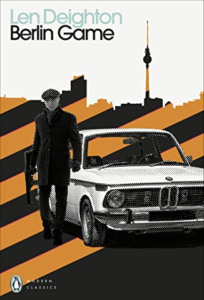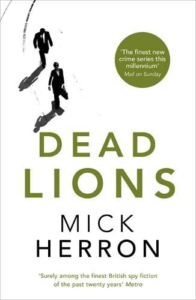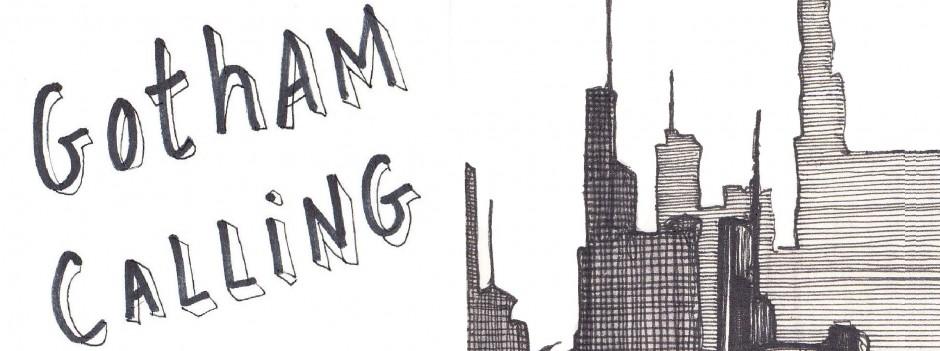Along with Eurocomics and old TV shows, I also like to use Gotham Calling to highlight cool spy novels. Here are a couple of British contributions to the genre that should please any self-respecting afficionados:
BERLIN GAME
(Len Deighton, 1983)

“’How long have we been sitting here?’ I said. I picked up the field glasses and studied the bored young American soldier in his glass-sided box.
‘Nearly a quarter of a century,’ said Werner Volkmann. His arms were resting on the steering wheel and his head was slumped on them. ‘That GI wasn’t even born when we first sat here waiting for the dogs to bark.’
Barking dogs, in their compound behind the remains of the Hotel Adlon, were usually the first sign of something happening on the other side. The dogs sensed any unusual happenings long before the handlers came to get them. That’s why we kept the window open; that’s why we were frozen nearly to death.
‘That American soldier wasn’t born, the spy thriller he’s reading wasn’t written, and we both thought the Wall would be demolished within a few days. We were stupid kids but it was better then, wasn’t it, Bernie?’
‘It’s always better when you’re young, Werner,’ I said.”
As you can guess by this opening at Checkpoint Charlie, Berlin Game is a Cold War classic. First published in the early ‘80s – when the Berlin Wall was still up – and told from the point of view of Bernard Samson, a middle-aged, somewhat jaded (yet committedly anticommunist) MI6 agent who keeps travelling between the UK, West, and East Germany, the circuitous plot revolves around two of the genre’s quintessential tropes: the perils of escaping from the GDR and an investigation into a possible Soviet mole in the British Secret Intelligence Service.
Yes, all this had been done before – including by Len Deighton himself, in the 1960s – but Berlin Game nails the formula to a tee, delivering plenty of authentic-sounding descriptions of spycraft and of life in divided Germany. The book may even appear to start off slowly, with a few detours into the protagonist’s upper-class milieu (unlike the unnamed hero of Deighton’s early novels, Bernard Samson married into wealth), yet once you get to the mystery at the core of the story, you’ll realize there were clues (and red herrings!) in each of those earlier scenes. Indeed, Berlin Game reads pretty much like a Raymond Chandler detective yarn, as Samson moves from one conversation to the next while we try to discern vital information among the sardonic dialogue (‘Werner’s too lazy to be a double agent – too lazy to be a single agent, from what I saw of him.’).
Like Chandler, Deighton buys a lot of good will with his compelling characterization of a shady underground (the British spy networks in Germany appear to be built almost entirely out of petty criminals), not to mention his ability to evoke places and atmosphere (which, I admit, resonate particularly well with me because of my own passion for Berlin):
“The Russians got the State Opera, the Royal Palace, the government buildings and some of the worst slums; the Western Powers got the Zoo, the parks, the department stores, the nightclubs and the villas of the rich in Grunewald. And spiked through both sectors, like a skewer through a shish kebab, there is the East-West Axis.
The Bendlerblock, from where the High Command sent the German Army to conquer Europe, has now been renamed. Nothing here is what it seems, and that appeals to me.”
To be fair, the division of Berlin and the GDR’s border control, although a real-life human drama, provided just the perfect raw material to fuel gripping thrills. In cinema, this had been a source of exploitation for years, going at least as far back as Carol Reed’s noirish The Man Between (made back when there was still relatively loose circulation in the city). Yet the escape narrative is only a small section of the overall book, which for the most part is quite light on action. The main appeal lies elsewhere: sexist and sarcastic, Bernard Samson has such a captivating voice – and Deighton does such an expert job of worldbuilding, bringing a memorable cast to life – that it’s no wonder Berlin Game ended up inaugurating a whole series, spawning eight sequels and a prequel.
Plus, in line with the interpretation that, under the façade of diplomatic crises and aggressive international relations, much of spy fiction – at least since Len Deighton and John le Carré joined the game –is actually about the world of mid-level work, a key portion of Berlin Game consists of discussions about office hierarchies, promotions, demotions, retirements, and loyalty to the company. It’s to Deighton’s credit that none of this ever feels boring, not least because of his sharp prose – like when he paints a whole picture of one of Samson’s superiors, Bret Rensselaer, in just a couple of paragraphs:
“Needless to say, Rensselaer had never served as a field agent. His only service experience was a couple of years in the US Navy in the days when his father was still hoping he’d take over the family-owned bank.
Bret had spent his life in swivel chairs, arguing with dictating machines and smiling for committees. His muscles had come from lifting barbells and jogging around the lawn of his Thames-side mansion. And one look at him would suggest that it was a good way to get to them, for Bret had grown old gracefully. His face was tanned in that very even way that comes from sun reflected off the Pulverschnee that only falls on very expensive ski resorts. His fair hair was changing almost imperceptibly to white. And the eye-glasses that he now required for reading were styled like those that California highway patrolmen hang in their pocket flap while writing you a ticket.”
DEAD LIONS
(Mick Herron, 2013)

“A fuse had blown in Swindon, so the south-west network ground to a halt. In Paddington the monitors wiped departure times, flagging everything ‘Delayed’, and stalled trains clogged the platforms; on the concourse luckless travellers clustered round suitcases, while seasoned commuters repaired to the pub, or rang home with cast-iron alibis before hooking up with their lovers back in the city. And thirty-six minutes outside London, a Worcester-bound HST crawled to a halt on a bare stretch of track with a view of the Thames. Lights from houseboats pooled on the river’s surface, illuminating a pair of canoes which whipped out of sight even as Dickie Bow registered them: two frail crafts built for speed, furrowing the water on a chilly March evening.
All about, passengers were muttering, checking watches, making calls. Pulling himself into character, Dickie Bow made an exasperated tch! But he wore no watch, and had no calls to make. He didn’t know where he was headed, and didn’t have a ticket.
Three seats away the hood fiddled with his briefcase.”
The second novel in the Slough House series, about an office/purgatory where MI5 sends its most disgraced agents to perform menial tasks (someone has to compile all those briefings the main spies get, after all), lives up to the promise of the incredible first installment. It shares the same initial structure, starting off with a taut, suspenseful sequence and then moving on to a tour of the Slough House building (this time, amusingly, from the point of view of a cat), thus making the book accessible for readers who are new to the series… Yet I would still recommend picking up Slow Horses first, if you can, because so much of the pleasure of Dead Lions derives from reencountering the surviving characters from last time and seeing how some of them have evolved in the intervening months – and how some remain grudgingly stuck in the same place.
Also back is Mick Herron’s grey version of London, which I find so utterly recognizable – a city of depressing bedsits, of buses diverted due to roadworks, of omnipresent electronic posters rotating day and night (‘drawing an absent public’s attention to unbeatable mortgage deals’), of foxes and rats rummaging through the bins of an empty-looking Chinese restaurant… alongside massive phallic skyscrapers and anti-capitalist demonstrations. While the general plot and situations will be pretty familiar for genre fans everywhere, the book is peppered with details that should especially resonate with anyone who was living in the UK in the early 2010s (worried about the possible power dynamics of forging an alliance with his boss, a character fears he might ‘end up being Nick Clegged’).
In particular, it’s fun to revisit Jackson Lamb, the unforgettable head of Slough House, whose abusive behavior – like his farts – may or may not be part of a winning psychological strategy to get his way… Regardless, we know there is at least a degree of sincerity to his curmudgeon attitude because Herron makes us private to his abrasive inner thoughts:
“Where Jackson Lamb was was Oxford, and he had a brand new theory, one to float in front of the suits at Regent’s Park. Lamb’s new theory was this: that instead of sending tadpole spooks on expensive torture-resistance courses at hideaways on the Welsh borders, they should pack them off to Oxford railway station to observe the staff in action. Because whatever training these guys underwent, it left every last one of them highly skilled in the art of not releasing information.”
Besides characterization, Mick Herron once again excels at plotting and prose. By plotting, I don’t mean just the story itself (although it is a satisfyingly relentless circuit of misdirection), but the way he keeps jumping from one short scene to the next, piling up twists and cliffhangers while making sure that every cast member adds at least one key piece of the larger puzzle being put together in front of our eyes.
As for the prose, Herron’s style isn’t particularly fanciful, but it has wit to spare, along with a nasty edge (‘The building opposite used to be a pub, and maybe hoped to be a pub again one day, but for the time being was making do with being an eyesore.’). He often delves into the minds of the cast and shuffles in their pettiest private thoughts, which is consistent with the overall leitmotif of contrasting high espionage with the mundane perspective of the average frustrated worker.
“If he’d been asked to draw a picture of what he’d expected from private security work, Carl Fenton would have drawn it big. There’d have been manual combat training; utility belts, Kevlar vests, Tasers. And driving, too: rubber-shredding take-offs and sharp cornering. He’d have had one of those earpieces with a hands-free mic attached, a necessity in the adrenalin-rich world of the security consultant, where you never knew what the next second might bring. That was what Carl Fenton had had in mind. Danger. Excitement. A grim reliance on his own physical competence.
Instead, he had a uniform that was too small, because the last guy in the job had been a midget, plus a rubber torch with a fading battery. And instead of riding shotgun in an armored limo, he had a nightly trudge up and down half a dozen corridors, calling in every hour on the hour; less to reassure management that the facility was still standing than to prove he was awake and earning his pay. Which was so slightly above minimum wage that if you split the difference, you’d have change from a quid. A job was a job, his mom never left off saying, but flush with the wisdom of nineteen years on the planet, Carl Fenton had found the flaw in this argument: sometimes a job was a pain in the arse.”
